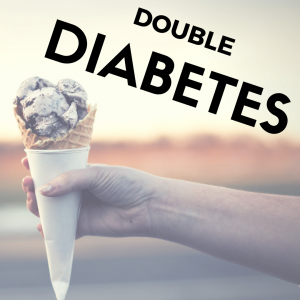
A few weeks back I had posted a picture of the infamous Unicorn Frappuccino. It was an image that equated the sugar load of the beverage with eating 3 Snicker’s bars. I made the comment ‘that if you’re as excited about this drink, then you should be as excited about diabetes.’
What ensued was a firestorm that I could have never predicted. I was getting hammered for perpetuating the notion that sugar causes diabetes and the shaming police were flicking on sirens and showing their lights all over the place. I was being accused of perpetuation a stigma, disease shaming, and diet shaming.
 And it wasn’t coming from anyone with type 2 diabetes but those moms and loved ones of people with type 1 diabetes. The momma bears were in full force and after I let the dust settle, I understand why. They are constantly having to explain and defend that their child’s condition isn’t from bad parenting nor chronic, reckless, lifestyle decisions.
And it wasn’t coming from anyone with type 2 diabetes but those moms and loved ones of people with type 1 diabetes. The momma bears were in full force and after I let the dust settle, I understand why. They are constantly having to explain and defend that their child’s condition isn’t from bad parenting nor chronic, reckless, lifestyle decisions.
Raising 3 boys with my wife, I know a mom will blame herself for anything that isn’t favorable, even if it’s out of her control. But where my point was being missed was that even though something isn’t your fault, it’s still your responsibility. And even if your child has type 1 diabetes, that child will have better outcomes by avoiding the things that contribute to type 2 diabetes…specifically a high sugar diet.
Regardless of the presentation of Type 1 or Type 2 diabetes, there’s a common theme, the regulation and utilization of insulin. One doesn’t produce insulin, the other, the cells don’t listen to insulin well.
In either scenario, the less need for insulin, the better the outcomes. If you consume the unicorn, regardless of endogenous insulin production or exogenous insulin injection, the high sugar load calls for a higher insulin need.
What I want to make clear is that even with type 1 diabetes, this doesn’t mean someone cannot develop type 2 diabetes simultaneously. Insulin is essential to the body for many reasons. But too much insulin becomes annoying to the cells, and the cells can start to ignore the signal, no matter if you’re type 1.
This means that for a type 1 diabetic, not only can you provide better health outcomes by limiting foods that require a high insulin response (grains, legumes, juices, sugar, etc), you can save some money by not needed as much insulin to combat those high glycemic foods.
I know for those moms with a type 1 diabetic kid, you want to provide what you can since they have started life with some extra challenges. But I challenge the notion that even though the type 1 diabetes was not your fault, that creating a low glycemic diet with time restricted eating will benefit the ups and downs of sugar spikes and insulin needs. So yes, that does mean limiting grains, juices, and everything that is the Standard American Diet. Yes, that probably does mean trying the total opposite nutrition advice of your dietician, pediatrician, and USDA sponsored eating plan.
But I also know that I get discredited because I don’t have the right initials after my name or the specialty after my name. But here’s someone that does. Take a look at his lectures, his documentary, his book, and take that information in the context of the insulin demand, not if insulin is coming from internal administration or from injection administration.
And to the woman/women that automatically assume I’m trying to sell something with my anti-sugar message, the only thing I’m trying to sell is creating a life culture of creating more health and needing less healthcare. It’s no surprise that healthcare is expensive. 86% off our healthcare costs are from chronic illness. If we want to have better health outcomes, then we have to stop arguing over who is going to pay for healthcare and instead ask what are we paying for? I said this with Obama, I will say this with Trump. I didn’t say no healthcare and I didn’t say perfect health. But if you haven’t realized it yet, the more we grant access of emergency interventions to treat chronic illness, the worst outcomes we have.
If the outcome is to create health then we have to question the health practices that have been drilled into our heads that have left us with ever increasing chronic illness. Not sure where to start? You know how to find me.


Hi Dr Kurt,
Which doctor are you referring to in your above post? You didn’t provide that person’s name. You provided a link to Facebook but you have to remember that not everyone is a member of Facebook. A link to that person’s own website or to their YouTube/Vimeo uploads would be helpful. Thank you.
Dr. Robert Lustig, Pediatric Endocrinologist.
I have had type 2 diabetes for nearly 30 years. I am now 79 years old and healthy.
I got no help from the medical profession. I had to figure it out myself, and I have. I tested every whole food I ate on my blood to see how it affected my blood sugar. I eat no processed food at all. Starchy foods are as bad or worse than sugar. I cut out all sugar, anything made from flour,
potatoes and rice. I eat high fat, low carbohydrate. I don’t count anything. I have a fiber diet as well.